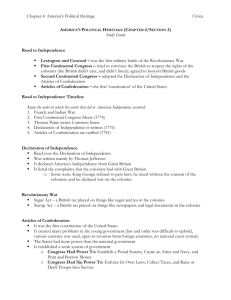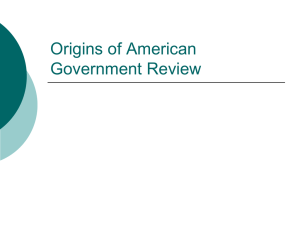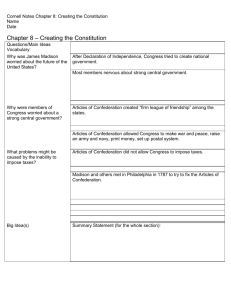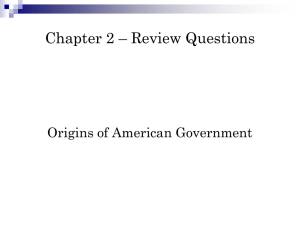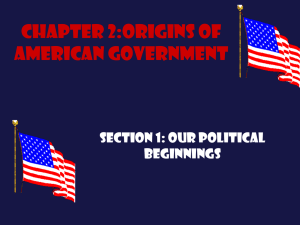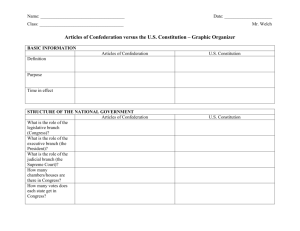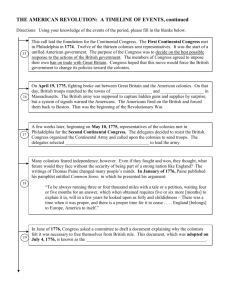CHAPTER 2 ORIGINS OF AMERICAN GOVERNMENT
advertisement
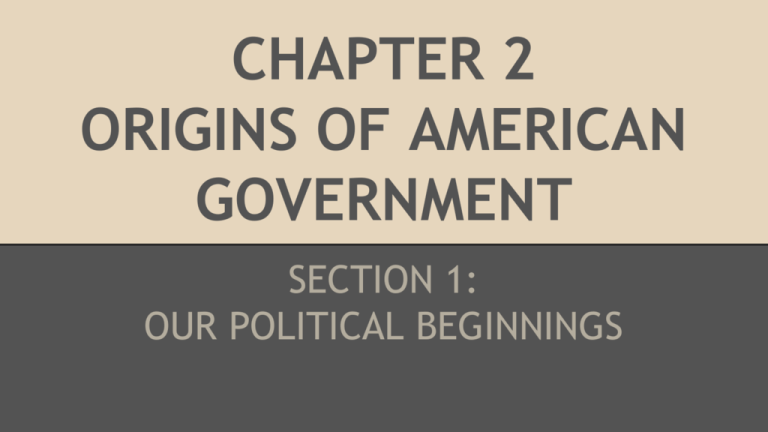
CHAPTER 2 ORIGINS OF AMERICAN GOVERNMENT SECTION 1: OUR POLITICAL BEGINNINGS OUR POLITICAL BEGINNINGS ❖ Basic Concepts of Government ➢ Early settlers brought ideas of government or political systems with them. ■ Most ideas came from England ● ● Rule of Law (Africa and Asia) Law, Religion, and Customs (Ancient Rome) ◆ Brought the 3 major ideas of government ➢ Ordered Government ➢ Limited Government ➢ Representative Government Ordered Government Limited Government Understood a need for orderly regulation of relationships between colonies. Understood the government is not all-powerful. (government must be restricted). Created local governments based on what they knew in England. Individuals have rights that government cannot take away. Sheriff --- Coroner Deeply rooted in English beliefs. Assessor -Justice of the Peace -Grand Jury -- Counties Townships Around for 400 years before Jamestown settled in 1607. Representative Government Government should serve the will of the people. People should have a voice in governmental decisions. Origination of “of the people, for the people. and by the people.” OUR POLITICAL BEGINNINGS (cont.) ❖ Landmark English Documents ➢ Magna Carta ■ Designed to protect against arbitrary acts by the king. ■ Established such rights as: ● ● ● heavy-handed Trial by Jury Due process of the law Private Property (life, liberty, property) ◆ Originally only done for privileged classes OUR POLITICAL BEGINNINGS (cont.) ❖ The Petition of Right ■ Limited the king’s power ● ● ● unable to imprison without judgement by peers or by law of the land unable to impose martial law (peacetime) ◆ could not order people to house king’s troops ◆ “no man should be compelled to make or yield any gift, loan, benevolence, tax, or such like charge, without common consent by act of parliament.” ■ Challenged the divine right of kings OUR POLITICAL BEGINNINGS (cont.) ❖ The Bill of Rights ■ Based on the English Bill of Rights ● Developed in 1689 by Parliament ◆ King William and Mary of Orange forced to sign ◆ ◆ ◆ ◆ ◆ No standing army in peacetime (Parliament consent) Parliamentary elections be free suspending laws, execution of laws without consent (illegal) levying money for crown without consent (illegal) right of subjects to petition king OUR POLITICAL BEGINNINGS (cont.) ❖ The English Colonies ➢ 13 schools of government ■ established separately over 125 years ● ● areas began developing communities based on area circumstances ■ colonies established on basis of a charter ■ Charter - a written grant of authority from the king. ● 3 types of colonies ◆ Royal ◆ Proprietary ◆ Charter OUR POLITICAL BEGINNINGS (cont.) ❖ Royal Colonies ➢ Subject to direct control of the crown. ■ 1775 Eve of Revolution ● NH - MA - NY - NJ - VA - NC - SC - GA ■ Came from quick success ● Charters were revoked ■ Patterns developed ● ● Governors were appointed by king Councils appointed by king ◆ Eventually became upper house of legislature ◆ Lower House - Bicameral legislature ➢ elected by property owners OUR POLITICAL BEGINNINGS (cont.) ❖ The Charter Colonies ➢ Based on charters given directly to colonists ■ CT - RI ■ mainly self-governing ■ Governors were elected every year by white, male property owners ■ King’s approval was needed ● did not typically ask for permission ■ Laws from bicameral legislature was not put before governor for approval or veto CHAPTER 2 ORIGINS OF AMERICAN GOVERNMENT SECTION 2: THE COMING OF INDEPENDENCE THE COMING OF INDEPENDENCE ❖ Britain’s Colonial Policies ➢ Controlled under the king ■ Parliament had little to do with colonies ● ● Started taking interest in Trade Left control of colonies to the crown ■ Colonies began self-government ● ● ● 2 months or more to reach England legislatures assumed lawmaking powers forced governors to do their will or would not pay them ■ Became federal type colonies ● ● England had power defense and trade George III forced more restrictive trade with colonies THE COMING OF INDEPENDENCE (cont.) ❖ Growing Colonial Unity ➢ Early governments ■ Confederation common purpose. ● ■ - joining of several groups fo New England - League of Friendship ◆ defense against Native Americans Albany Plan of Union - formation of an annu congress of Delegates (representatives) fro each of the 13 colonies. THE COMING OF INDEPENDENCE (cont.) ● ● ● ● ● raise military and naval forces make war and peace with Native Americans regulate trade with Native Americans tax collect customs duties ◆ Agreed upon at the meeting ◆ rejected by the colonies and Crown THE COMING OF INDEPENDENCE (cont.) ➢ The Stamp Act of Congress ■ Law required the use of tax stamps on al documents, on certain business agreeme and on newspapers ● ● ● were disliked taxation without representation ◆ All but 4 colonies organized and formulated a protest ➢ Declaration of Rights and Grievances ■ sent to King Parliament repealed tax ◆ tensions remained - new laws and policies passed THE COMING OF INDEPENDENCE (cont.) ❖ Continental Congress ➢ First in September 5, 1774 ■ Parliament passes new laws to punish colonists. ● ● Denounced in American Intolerable Acts ◆ All colonies sent representatives to Philadelphia except GA ◆ Met and discussed actions for nearly 2 months ◆ Urged each colony to refuse trade until repealed - taken back ◆ Sent Declaration of Rights to King George III ➢ Ended October 26, 1774 ■ A second was to be held in May 1775 THE COMING OF INDEPENDENCE (cont.) ❖ Continental Congress (cont.) ● 1774-1775 English government refused compromise ➢ Second met May 10, 1775 ● Revolution had already begun ■ Each colony sent representatives this time ■ Hancock chosen as president of Congress ■ Continental army created ● George Washington name as Commander-in-Chief ■ First national government ● ● Last 5 years Declaration of Independence (1776)- Articles of Confederation (1781) THE COMING OF INDEPENDENCE (cont.) ❖ The Declaration of Independence ➢ “Resolved, That these United Colonies are, and of right ought to be, free and independent States, that they are absolved from all allegiance to the British Crown, and that all political connection between them and the State of Great Britain is, and ought to be, totally dissolved.” ■ Congress named 5 to create a proclamation of independence. Richard Henry Lee ● Benjamin Franklin - John Adams - Roger Sherman - Robert Livingston THE COMING OF INDEPENDENCE (cont.) ❖ The First State Constitutions ➢ between 1776 and 1777 most states adopted a written constitution ➢ Massachusetts has oldest constitution in the world. ➢ Popular Sovereignty - government can exist the consent of the governed. on CHAPTER 2 ORIGINS OF AMERICAN GOVERNMENT SECTION 3: The Critical Period THE CRITICAL PERIOD ❖ Articles of Confederation ➢ Richard Henry Lee’s resolution led to Declaration of Independence. Also asked for a plan of confederation. ■ After 17 months deliberating ● November 15, 1777 - Articles were approved. ■ Each state kept its sovereignty, freedom, independence. ● Went into effect March 1, 1781. ◆ What was the delay? THE CRITICAL PERIOD (cont.) ❖ Articles of Confederation ➢ Governmental Structure ■ Congress was sole body ■ Unicameral ● Delegates chosen yearly ■ Congress would choose one delegate as the presiding officer THE CRITICAL PERIOD (cont.) ❖ Articles of Confederation ➢ Powers of Congress ■ It could make war and peace ■ send and receive ambassadors ■ make treaties ■ borrow money ■ establish money system ■ create post offices ■ build navy and raise army ■ settle disputes between the states THE CRITICAL PERIOD (cont.) ❖ Articles of Confederation ➢ State Obligations ■ agreed to obey Articles and acts of Congress ■ fund and provide troops ■ treat citizens from other state fairly and equally ■ surrender fugitives from justice ■ submit disputes to Congress ■ allow open travel and trade ■ retained all other powers not given to Congress THE CRITICAL PERIOD (cont.) ❖ Articles of Confederation ➢ Weaknesses ■ One vote for each State, regardless of size ■ Congress powerless to lay and collect taxes ■ Congress powerless to regulate foreign and interstate commerce ■ No executive to enforce acts of Congress ■ No national court system ■ Amendment only with consent of all states ■ a 9/13 required to pass laws ■ Articles only a “firm league of friendship” THE CRITICAL PERIOD (cont.) ❖ The Critical Period, the 1780s ➢ Revolutionary War ended in October 1781 ■ Victory confirmed by the Treaty of Paris in 1783 ■ Problems of economics and politics ● Caused by the weakness of the Articles ◆ Why? ➢ bickering between states ➢ established trade with foreign governments ➢ refused to fund Congress ➢ own military forces ➢ taxed goods - banned others THE CRITICAL PERIOD (cont.) ❖ The Critical Period, the 1780s ➢ Revolutionary War ended in October 1781 ■ Victory confirmed by the Treaty of Paris in 1783 ■ Problems of economics and politics ● Caused by the weakness of the Articles ◆ Why? ➢ bickering between states ➢ established trade with foreign governments ➢ refused to fund Congress ➢ own military forces ➢ taxed goods - banned others THE CRITICAL PERIOD (cont.) ❖ A Need for Stronger Government ➢ Wealthy paved the way ■ movement began in 1785 ➢ Mount Vernon ■ Maryland and Virginia ● ● met to settle trade disputes January 21, 1786 called for a meeting of all states ◆ because of the meeting called for a federal plan for regulating commerce ➢ Annapolis ■ meeting took place 9/11/1786 - 5 states CHAPTER 2 ORIGINS OF AMERICAN GOVERNMENT SECTION 4: CREATING THE CONSTITUTION CREATING THE CONSTITUTION ❖ The Framers - group of delegates who attended the Philadelphia Convention ➢ Worked in secrecy ➢ Called to recommend changes to the Articles ■ Delegates agreed to create a new government ➢ Virginia Plan - new government with 3 separate branches ➢ New Jersey Plan - maintained a unicameral government with equal representation CREATING THE CONSTITUTION ❖ The Framers - group of delegates who attended the Philadelphia Convention ➢ Worked in secrecy ➢ Called to recommend changes to the Articles ■ Delegates agreed to create a new government ❖ Virginia Plan - new government with 3 separate branches ❖ New Jersey Plan - maintained a unicameral government with equal representation ➢ Federal executive chosen by Congress CREATING THE CONSTITUTION ❖ Disagreements over representation ➢ The Connecticut Compromise - Congress should be composed of two houses. ■ Senate equal representation by state ■ House representation based on population ➢ Three-Fifths Compromise - all free persons should be counted and ⅗ of all other people. CREATING THE CONSTITUTION ❖ Disagreements over representation ➢ The Commerce and Slave Trade Compromise forbid Congress from taxing the export of goods from any state. ➢ A Bundle of Compromises - the Constitution is often referred to as this. ■ Based on the many differences of opinions CREATING THE CONSTITUTION ❖ Sources of the Constitution ➢ ➢ ➢ ➢ ➢ ➢ ➢ ➢ Ancient Greece Ancient Rome Contemporary Great Britain Contemporary Europe Commentaries on the Laws of England - William Blackstone The Spirit of the Laws - Baron de Montesquieu Social Contract - Jean Jacques Rousseau Two Treatises of Government - John Locke CREATING THE CONSTITUTION ❖ September 8, 1787 ➢ Revision and styling ❖ September 17, 1787 ➢ approved the work ➢ 39 names added CHAPTER 2 ORIGINS OF AMERICAN GOVERNMENT SECTION 5: RATIFYING THE CONSTITUTION Federalists and Anti-Federalists Federalists - favored ratification Believed that the Articles should be changed Anti-Federalists - opposed ratification Opposed the new document The Constitution was highly debated Federalists and Anti-Federalists September 13, 1787 11 of 13 states under the new government New Congress convened on March 4, 1789 could not count votes of presidential elections Lacked a QUORUM - a majority it could not count electoral votes. April 6, 1789 votes counted electing Washington
